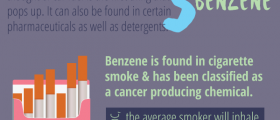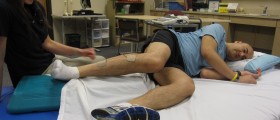General overview
The medical term given for smelling any odour which isn't present - whether it be smoke, dirt, cabbages, etc. - is phantosmia or olfactory hallucinations.
The odours which are experienced vary from person to person and can range from foul smells to more pleasant ones.

Causes
Although the exact cause of phantosmia is not known, it is thought that certain central and peripheral issues can explain the presence of this symptom. These problems include respiratory, psychological and neurological disorders.
Respiratory issues
Upper respiratory tract infections - such as sinusitis, chronic rhinitis and allergic rhinitis - may cause certain rogue neurons to malfunction or the olfactory neurons to malfunction themselves.
This then results in the brain receiving incorrect olfactory signals and the patient then experiences different smells.
Psychological issues
Mental health issues such as schizophrenia and Alzheimer's disease are known to be associated with symptoms such as hallucinations. Patients with Parkinson's disease have also been noted to suffer from this issue, although it is rare.
READ New solutions in Pharmacotherapy of Schizophrenia
Usually these hallucinations are auditory and visual in nature, but olfactory hallucinations have been known to occur. Olfactory delusions seem to be the more prominent issue in these patients, especially Alzheimer's disease, where they can't be convinced that what they are smelling isn't real.
Neurological issues
Neurological pathology is a central cause of phantosmia and occurs due to misinterpretation of the olfactory signals by the brain.
Neuroblastomas are malignant cancers which originate from the olfactory nerve. It should be noted that this is a rare occurrence, but it should be investigated if all other causes have been excluded.
Temporal lobe epilepsy
This condition occurs due to an anatomical defect or due to injury to the temporal lobe of the brain.
The main symptoms of this condition are as follows:
Auras
These are unusual sensations which suggest that something is going to happen. Not everyone experiences them, but not everyone who does experience them remember these auras. Examples of auras include the following:
- Deja vu experience.
- Sudden sense of fear.
- Rising sensation in the stomach.
- Sudden or strange odour or taste.
Other characteristic signs and symptoms include the following:
- Staring blankly.
- Loss of awareness of surroundings.
- Lip smacking.
- Unusual finger movements.
- Repeated swallowing or chewing.
TLE is managed with anti-epileptic medication and would require lifelong treatment.
Management of olfactory hallucinations/phantosmia
There are home remedies and certain medications which may be used to bring relief of this problem. They include the following:
- Saline nasal sprays - this helps to clear out the sinuses which makes breathing easier. This then prevents incorrect signals to be sent by the olfactory neurons.
- Topical anaesthetic solutions - these are applied to the nostrils and help to desensitize the neurons.
- Venlafaxine - this is an antidepressant which belongs to the serotonin noradrenaline reuptake inhibitor or SNRI group.















